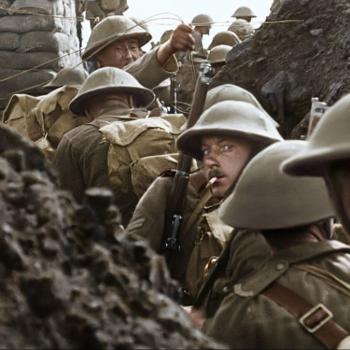ON THE MORNING of our last full day in France, we took an intercity train from Paris out to Normandy. For this journey, we were not on the TGV, France’s futuristic high-speed train system. We were on an intercity express train, which, despite not being a proper bullet train, still moved with dispatch out of Paris and into the sylvan and achingly beautiful French countryside.
We arrived in Caen about two hours after we started, and rented a car for the day. We drove out to the site of Omaha Beach, and parked in a little town called Vierville-sur-Mer situated on the bluffs directly above the sector of the beach portrayed in the opening minutes of Steven Spielberg’s landmark 1998 film, “Saving Private Ryan.”
We walked out onto the sand, and after examining a few remnant bunkers and other structures, we walked out to the edge of the surf. Then I turned around and looked up at what the first waves of men ashore saw on that terrible June morning just over 70 years ago.
Stunned by what I saw, I turned to my travel companion and said, “My God — those poor men.”
There at the water’s edge, it was as if we were on the stage of an ancient amphitheater. It was not difficult to imagine the “audience” of defending Germans looking down from cliffs that are still riddled with their fortifications. The Germans were pouring rivers of machine gun fire into the landing craft from three sides. I stood on Omaha Beach and gained a new appreciation for just how brave were the men who stormed it.
By the end of that first day, thousands of Americans lay dead on those lethal sands. It is something close to a miracle that the beach was taken at all.
After exploring the area for most of the morning, we ordered pizza at a little café in Vierville, and despite the fact that the proprietor spoke no English, received exactly what we ordered. It was delicious so we thanked her profusely in English, she thanked us back in French, and somehow everyone understood — the little miracles of travel.
From the beach, we drove to the Normandy American Cemetery and Memorial. The territory on which the cemetery sits was a concession by the French to the American people. It felt odd at first to see an American flag hold the place of honor in that faraway location, yet utterly fitting. given the sacrifice of the servicemen buried there.
The crosses in that cemetery stretched into the far distance. More than 9,000 men are buried there, giving mute testimony to the ferocity of the fighting in Normandy. The sacrifice was thoroughly democratic — headstones of farm boys and the sons of presidents (Teddy Roosevelt lost two sons in European wars) mingled together, the only difference being the names marked on the crosses.
We walked out among the graves, and as we walked, neither of us said anything. It was as if we both felt an obligation to contemplate their sacrifice in silence. As we passed row after row of crosses and Stars of David, I was nearly overcome with sadness. I remembered a poem from the First World War, by Lt. Col. John McCrae:
“In Flanders fields the poppies blow
Between the crosses, row on row,
That mark our place; and in the sky
The larks, still bravely singing, fly
Scarce heard amid the guns below.
We are the Dead. Short days ago
We lived, felt dawn, saw sunset glow,
Loved and were loved, and now we lie
In Flanders fields.
“Take up our quarrel with the foe:
To you from failing hands we throw
The torch; be yours to hold it high.
If ye break faith with us who die
We shall not sleep, though poppies grow
In Flanders fields.”
We visited the Mémorial de Caen, a museum in the city of Caen dedicated to the history and causes of World War II, with a particular focus on the battle for Normandy.
My nephew Connor would love that place. He’s kind of a World War II buff, and there were examples of the equipment and weaponry from every side, including entire airplanes hanging from the ceiling.
Among the helmets, propaganda posters and other relics, there was one item that struck me as incredibly poignant:

It is a blouse made by a mother for her young daughter from a piece of parachute cloth she had scavenged from the field.
It is beautifully made, and has a couple of triangular areas on the front with elaborate stitching that looks almost like lace, and there are four pretty mother-of-pearl buttons in a placket at the front.
It was poignant because it seemed above all to be an act of almost heroic hope in the face of the violence, madness and death of that time. She had taken an instrument of war, and transformed it into something beautiful for her child. I could almost hear that long ago mother: “Go get those buttons I’ve been saving, honey. They will be so pretty on your new blouse!”
I thought of another and far older piece of poetic writing:
“…and they shall beat their swords into plowshares and their spears into pruninghooks; nation shall not lift up sword against nation, neither shall they learn war any more.”
—Isaiah 2:4












